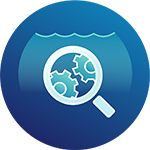
Aquaculture
The Science of Feeding the World
According to the Food and Agriculture Organization of the United Nations, approximately 4.5 billion people get a significant source of their daily protein intake from fish.[1] But that doesn’t mean billions of people are at the pier every morning casting their line out into the ocean (although plenty certainly do). Nor does it mean that all that fish is being caught out in the wild by commercial fisheries (although plenty of it certainly is). What it does mean, however, is that farm-raised fish and seafood – through a process known as aquaculture – plays a vital and growing role in satisfying the world’s food demands.
Aquaculture is the process of farming fish, shellfish, and plants in aquatic environments. It can be through submersible pens in the ocean or artificial ponds hundreds of miles from the nearest natural body of water. Still, wherever and however it is done, the main goal of an aquaculturist is to increase the production of whatever is being farmed (e.g., fish, shrimp, oysters, seaweed, etc.) beyond what is possible in nature. Aquaculture serves many different purposes, including the restoration of endangered species populations, wild stock population enhancement, fish habitat restoration, and the cultivation of exotic fish for aquariums, but its primary and most important purpose is food production.[2] Approximately fifty percent of worldwide seafood consumption is raised via aquaculture.[3] Because there has been such a steep decline in wild fish stocks, aquaculture is widely recognized as an increasingly important way to meet the seafood demands of a growing population. In fact, over thirty percent of wild fish stocks have already reached their biological limit because of destructive fishing practices and overfishing.[4] As a result, aquaculture is the fastest-growing food production system globally.[5]
Commerce or Science
Aquaculture is one of those fields of study (along with biomedical engineering and biotechnology) that fits under both commerce and science. That’s because while aquaculture is big business, that business is dependent on living organisms and, therefore, requires knowledge of biological, chemical, environmental, freshwater (limnology), and oceanographic science. To manage an aquaculture company, you would certainly benefit from having a master’s degree in business. To operate an aquaculture company, you would certainly benefit from having a master’s degree in biology or another relevant area of science. But to own and operate a successful and profitable aquaculture company, you better have both that degree in business and science because it is one of the few industries where knowledge of Aeromonas Hydrophila is as essential as knowledge of financial statements.
Environmental Concerns
When practiced on an industrial scale, aquaculture is not without its detractors. There are concerns over threats to both the environment and human health caused by (i) the spread of deadly diseases and parasites; (ii) the pollution of the ocean from nutrients, antibiotics, pesticides, and other chemicals; (iii) the discharge of nonnative species into the ocean; (iv) the destruction of mangrove forests and (v) the overfishing of wild fish to feed carnivorous farmed fish.[6] These concerns have led to a call for greater oversight and regulation of the aquaculture industry.
…
Citations
- The Global Food System: An Analysis, Metabolic.
- What is Aquaculture?, Conserve Energy Future.
- What is Aquaculture?, Aquaculture Stewardship Council Foundation.
- What is Aquaculture?, Aquaculture Stewardship Council Foundation.
- About Aquaculture, NOAA Fisheries.
- About Aquaculture, Center for Food Safety.

The Path to Becoming an Aquaculturist
From High School to Your First Job
Build a Solid Academic Foundation
Basics:
Take all available STEM-related courses (biology, physics, chemistry, computer science, mathematics) offered at your high school. Take all these classes at the most advanced level possible (honors, AP). This will help you to learn to think critically, problem-solve, and build your knowledge base.
Recommended:
If not available at your high school, try and take biology-related (marine biology, microbiology, fish genetics, fish physiology, ecology), aquaculture or fisheries science-related, environmental science-related, and aquatic science-related (hydrology, limnology, oceanography) classes offered online.
Keep in Mind:
Try and get work experience through a research internship or summer program. Learn how to write for a technical and non-technical audience. The ability to communicate clearly in writing cannot be overstated. Spend time learning the basics, and the more complex concepts will follow naturally.
Dive In!
And become an expert
![]()
Peruse our library of must-read books
![]()
Thumb through a scientific publication
![]()
Take an online course
![]()
Watch an interesting video
![]()
Check out these great websites
Get a

jump on your Academic career
There’s no substitute for experience.
We have compiled a database of thousands of internships, research opportunities, academic programs and specialized training programs so you can get a jump on your academic career.
Internships
Research
Academic Training Programs
And if you need support to fulfill your dreams and ambitions, our searchable database has plenty of scholarship opportunities as well as programs designed to increase diversity in the sciences.
Scholarships
Diversity, Equity & Inclusion
Need Help Finding Your Opportunity?
Our video tutorials explain the ins and outs of landing a great internship, research project or training program.
Make all the right moves
Advice from those who know
Maintain an excellent GPA, especially in the sciences
Have some work experience on your resume
Attend professional conferences and aquaculture seminars
Take business courses
Present your research at student research colloquiums
Build experience through internships or as an undergraduate researcher
Join professional societies and organizations
Stay current by reading professional and scientific journals
Learn about current research projects
What degree is right for you?

Bachelor’s Degree
A bachelor’s degree is the minimum requirement to work in the field of aquaculture. If you do not attend a school with a specific aquaculture major, you should obtain a degree in a constituent area (ichthyology, marine biology, physiology, zoology) and add coursework in hydrology, limnology, and oceanography. Familiarity with fieldwork techniques and the use of scientific instrumentation is essential.
Master’s Degree
A master’s degree is recommended as this is where you will be able to specialize your studies in aquaculture. Obtaining your master’s degree will also result in better employment opportunities at the state and federal level as well as in the private sector. If your undergraduate degree was not specifically in aquaculture, then a master’s degree (aquaculture or fisheries) may be required to obtain a better position as well as for future advancement.
Doctorate
A doctoral degree and, most likely, post-doctoral studies are required if you want to have a career in academia. Senior-level positions in state (fish and wildlife departments) and federal government agencies (U.S. Department of Agriculture, National Oceanic and Atmospheric Administration) and executive-level positions in the private sector (pharmaceuticals, industrial fisheries, biotechnology firms, private research institutions, consulting firms) may also require that you have your doctoral degree.
10 Schools With Excellent Aquaculture Programs
Want to see the full list of colleges and universities with degree offerings or relevant courses?
Aquaculture and Aquarium Science
Roger Williams University
Aquatic and Fishery Science
University of Washington
Fisheries and Aquatic Sciences
Ohio State University
Aquatic Sciences – Aquaculture Specialization
Purdue University
Aquaculture and Fisheries Science
University of Rhode Island
Fisheries, Aquaculture, and Aquatic Sciences
Auburn University
Aquaculture and Aquarium Science
University of New England
Fisheries and Mariculture Program
Texas A&M University-Corpus Christi
Marine Biology and Aquaculture
Salem State University
Aquaculture and Fisheries Sciences
University of Arkansas at Pine Bluff
![]()
Tip 1
Many universities offer degrees in wildlife and fisheries with coursework in aquaculture. The key is to get a good grounding in the relevant areas of science and round out your knowledge with internships or graduate school.
![]()
Tip 2
Even if you don’t want to work for a large industrial aquaculture company, try and get an internship with one because they will have the most structured training programs for learning aquaculture principles and practices.
![]()
Tip 3
While being an aquaculturist falls under the realm of science, aquaculture is a business, so you should have some knowledge of good business practices. Even the best scientist can’t save an unprofitable aquaculture company.
Have familiarity with one or more of the following areas

Repair and maintain machinery

Animal husbandry

Environmental chemistry

Use and maintenance of lab equipment

Geographical Information Systems

Hatchery lab skills

Poisons and toxins

Water quality monitoring

Aquaculture technology

Marine field data collection and analysis
Typical Job Functions of a Aquaculturist
Here are some of the interesting things you could be doing.
Operating and maintaining aquaculture farms.
Monitoring fish behavior, feed consumption, and water quality parameters.
Implementing breeding programs and coordinating growing schedules.
Conducting examinations to identify diseases or parasites.
Designing aquaculture systems for marine and freshwater systems.
Coordinating activities to improve hatching and growth rates.
Monitoring the movement of mature fish to lakes, ponds, streams, and commercial tanks.
Monitoring environments to create better conditions for aquatic life.
There’s an Ocean of Possibilities
Aquaculture is a great career choice for someone who wants to contribute to securing the world’s food supply. Aquaculture also allows you to pursue two distinct career paths – business and science – or for those who want to run their own aquaculture company, combine both into one interesting career.
Common jobs include:
- Aquaculture Entrepreneur
- Farm Manager
- Hatchery Manager
- Fishery Officer
- Research Officer
- Science Officer
- Biological Technician
- Aquaculture Consultant
- Exporters
- Traders
- Professors and Teachers
- Veterinarians
Common employers include:
- Aquaculture Farms
- Fisheries
- State and Federal Government
- Nongovernmental Organizations
- Nonprofit Organizations
- Pharmaceutical Companies
- Universities and Schools
- Research Institutions
- Aquariums
- Zoos
- Seafood Companies
Start your career search with our extensive list of employment websites.
